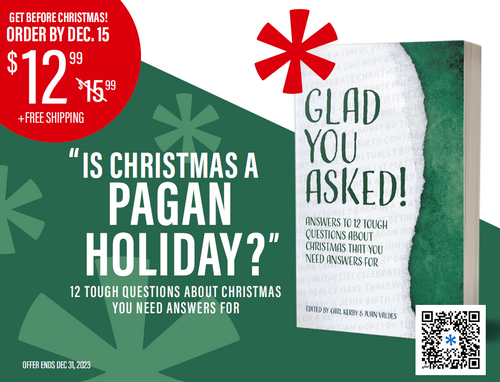It's Not Luck--It's Providence
"The early arrival of an airplane and a VIP trip to the restroom reinforce a wonderful truth about God. " Join us today as we read a special blog by one of the writers/speakers for The Friends of Israel Gospel Ministry, Steve Herzig, as he reminds us nothing happens by coincidence.

In June, I returned from ministering in Colorado on a red-eye flight, scheduled to arrive in Philadelphia, Pennsylvania, at 5:36 a.m. Overnight flights are common for me. The only unusual part of this trip came after we landed, when the pilot said, “Folks, we got you here 20 minutes early. Thanks for flying United.”
The early Sunday morning traffic was light, which allowed me to drive north on Interstate 95 (I-95) easily and pull into my driveway at 5:55 a.m. After taking a short nap, I checked the news. I was shocked to read, “An elevated section of Interstate 95 collapsed early Sunday in Philadelphia after a tanker truck carrying flammable cargo caught fire, closing a heavily traveled segment of the East Coast’s main north-south highway indefinitely. . . . The accident took place around 6:15 a.m.”
I did the math and quickly realized how close I had come to disaster. If my flight hadn’t landed early, I might have been driving on the highway as it broke apart and plunged onto the roadway beneath.
Later, Patty Larsen, my colleague at The Friends of Israel Gospel Ministry, shared an interesting story of her own with me:
I recently went to the theater with my daughter and 7-year-old granddaughter. During intermission, we went to use the women’s restroom. As we waited in line, I looked down and saw the hairiest man’s legs I had ever seen. I could see the man’s legs because he was wearing a skirt.
I was horrified, but I didn’t dare say anything for fear of making a scene. My mind was racing. I felt paralyzed. I didn’t want my granddaughter sharing a restroom with a man.
Before I could even pray, the doors of a nearby elevator opened; and a woman pointed to me. I pointed at myself and mouthed, “Me?” The woman nodded and ushered us into the elevator. Of all the women in line, we were the only ones she asked to come. She then took us up to a completely empty bathroom on the top floor. I felt like she was an angel sent from God.
I was horrified, but I didn’t dare say anything for fear of making a scene. My mind was racing. I felt paralyzed. I didn’t want my granddaughter sharing a restroom with a man.
Before I could even pray, the doors of a nearby elevator opened; and a woman pointed to me. I pointed at myself and mouthed, “Me?” The woman nodded and ushered us into the elevator. Of all the women in line, we were the only ones she asked to come. She then took us up to a completely empty bathroom on the top floor. I felt like she was an angel sent from God.
Recognizing Providence
These events might be natural and explainable. Yet, Patty and I could see that a sovereign God intervened in our lives. As believers, we see the mystery of God’s provision, which we call providence.
As multitudes gathered on the mountain we now call the Mount of Beatitudes, Jesus told the crowd:
Matthew 6:25–26
Therefore, I say to you, do not worry about your life, what you will eat or what you will drink; nor about your body, what you will put on. Is not life more than food and the body more than clothing? Look at the birds of the air, for they neither sow nor reap nor gather into barns; yet your heavenly Father feeds them. Are you not of more value than they?
God takes care of the birds, and He takes care of us. He gives us what we need exactly when we need it. For me, the need was an early arrival; for Patty, a safe restroom.
R. Kent Hughes, former senior pastor of College Church in Wheaton, Illinois, explained divine providence as follows: “God sovereignly works in and through the everyday, non-miraculous events of life to effect His will.” Bible commentator David M. Levy defined divine providence as “God’s active care, control, and governance over everything in His created universe by His sovereign will (Eph. 1:11) in wisdom and love.” Patty’s story and mine testify that God’s provision in believers’ individual lives results in our praising and thanking Him, which leads to stronger, closer relationships with Him.
Answering Skeptics
Not everyone agrees with such heaven-focused thinking. The New York Times best-selling author Sam Harris is known as one of “The Four Horsemen of New Atheism” (along with Richard Dawkins, Daniel Dennett, and Christopher Hitchens) because of his credentials and vast expertise on such topics as neuroscience, philosophy, religion, politics, and artificial intelligence.
Harris maintains that events happen randomly. He believes not in God’s providence but, rather, in luck. His view on divine care appears in his book Free Will, in which he discusses the differences between a conservative and a liberal:
Harris maintains that events happen randomly. He believes not in God’s providence but, rather, in luck. His view on divine care appears in his book Free Will, in which he discusses the differences between a conservative and a liberal:
Liberals tend to understand that a person can be lucky or unlucky in all matters relevant to his success. Conservatives, however, often make a religious fetish of individualism.
Many seem to have absolutely no awareness of how fortunate one must be to succeed at anything in life, no matter how hard one works. One must be lucky to be able to work. One must be lucky to be intelligent, physically healthy, and not bankrupted in middle age by the illness of a spouse.
Consider the biography of any “self-made” man, and you will find that his success was entirely dependent on background conditions that he did not make and of which he was merely the beneficiary. There is not a person on earth who chose his genome, or the country of his birth, or the political and economic conditions that prevailed at moments crucial to his progress.
Many seem to have absolutely no awareness of how fortunate one must be to succeed at anything in life, no matter how hard one works. One must be lucky to be able to work. One must be lucky to be intelligent, physically healthy, and not bankrupted in middle age by the illness of a spouse.
Consider the biography of any “self-made” man, and you will find that his success was entirely dependent on background conditions that he did not make and of which he was merely the beneficiary. There is not a person on earth who chose his genome, or the country of his birth, or the political and economic conditions that prevailed at moments crucial to his progress.
Harris is right about one thing: No one can make his or her own choices before birth. But by dismissing the reality of a God who makes those choices for His sovereign purposes, Harris turns life into a roll of the dice.
When the apostle Paul preached the gospel in Greece, he encountered many skeptics like Dr. Harris. The Epicurean and Stoic philosophers called Paul a “babbler” (Acts 17:18). They brought him to the Areopagus and asked him to explain the “strange things” he was talking about (vv. 19–20), and Paul expounded the truth that the one and only sovereign God of the universe is a God of providence.
He told them God is the Creator, “who made the world and everything in it, since He is Lord of heaven and earth” (v. 24).
He told them God is the Life-giver, who “gives to all life, breath, and all things. And He has made from one blood every nation of men to dwell on all the face of the earth, and has determined their preappointed times and the boundaries of their dwellings” (vv. 25–26).
He told them God is personal: “He is not far from each one of us” (v. 27).
Some mocked Paul, just like people today mock those of us who believe in the one true God. But Paul was not discouraged; instead, he departed to introduce others to our great God.
Sharing Stories
From time to time, God shows Himself to people like Patty, you, and me. We share our experiences with others to help them see the God who demonstrates exactly who He is.
Many choose not to think about such a personal and powerful God, though they say they are “glad it works” for us. My mother feels this way. She uses a Yiddish expression whenever these “coincidences” and “lucky” things happen.
“What’s bashert is bashert,” she says. “What will be, will be.”
I don’t believe that.
I don’t believe that.
The only way I can explain why I wasn’t on I-95 when it collapsed and why Patty’s 7-year-old granddaughter wasn’t in a ladies’ restroom with a man dressed like a woman is found in Proverbs 3:5–6:
Trust in the LORD with all your heart, and lean not on your own understanding; in all your ways acknowledge Him, and He shall direct your paths.
I am thankful for a God who is looking out for Patty, you, and me.
**This article, originally printed in the Israel My Glory magazine, (November/December 2023, pp. 12–13) is used by permission.
Author Bio:
Steve Herzig is the vice president of North American Ministries and a Bible teacher for The Friends of Israel Gospel Ministry.
To learn more about Steve and the mission and scope of The Friends of Israel Gospel Ministry, please visit www.foi.org.
Steve Herzig is the vice president of North American Ministries and a Bible teacher for The Friends of Israel Gospel Ministry.
To learn more about Steve and the mission and scope of The Friends of Israel Gospel Ministry, please visit www.foi.org.
Are You Looking for Christmas Gifts for Friends and Family with Spiritual Returns? Look no further!


Just go to our Reasons for Hope Online Store at RforH.com/store to find these items, other books and t-shirts, too!
Posted in Steve Herzig
Posted in Reasons for Hope, Steve Herzig, providence, Matthew 6:25-26, Acts 17, Proverbs 3:5-6
Posted in Reasons for Hope, Steve Herzig, providence, Matthew 6:25-26, Acts 17, Proverbs 3:5-6
Recent
Archive
2026
2025
February
March
April
May
June
July
August
November
2024
February
March
April
May
June
July
August
September
November

No Comments